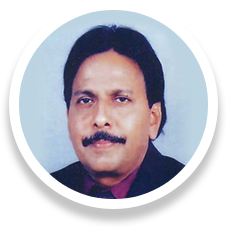“What is the root cause of all human relations problems?” This was a question raised in a ‘Human Resource Management’ class by the professor.
Beating about the bush students gave different answers but the professor was not satisfied. Finally they asked the professor for a clue to the answer.
“Yes, I can give you a clue now”
Students eagerly looked at his eyes.
‘It’s a one letter word”; he said and waited for the answer. They still failed to bring about the correct answer. So, professor said; “It’s ‘I’, it’s your ego. The ‘I’ centered person is not concerned or bothered about others, since he is focused on himself. He thinks and tries to show, that he is superior to others. His pride does not allow him accept his own faults and limitations and acknowledge others’ talents and achievements”.
Students moved their heads in agreement.
Then, the professor continued; “You all know Jesus was crucified on a wooden cross. What is the message given by a cross?”
There was pin drop silence in the class.
“It’s when you strike across the letter ‘I’ you get the shape of a cross. The cross gives the message to strike down your ‘I’ centeredness, your ego.”
After some time, one student stood up and enthusiastically added; “Sir, I is at the centre of the word pride”
“Exactly, I congratulate you for your wise observation. The essence of pride is ‘I’ centeredness;” professor said.
“As the famous English art critic and author, John Ruskin pointed out; in general pride is at the bottom of all great mistakes”; he concluded with a smile.
What is Pride?
The famous English writer and thinker, Benjamin Whichcot rightly pointed out; ‘None are so empty as those who are full of themselves’. Men with pride are excessively interested in themselves and rarely concerned about others. They have an inflated ego and try to show others that they are superior to all others. They always talk about themselves, their achievements and their merits. Their self projection and display of obnoxious superiority may become intolerable to others, even to their friends and family. Pride is a form and sign of selfishness. The snarl of pride will ruin your relations and spoil your reputation. Ignorance is the source of pride. According to Bhagavad-Gita, pride is the sure route to hell. Holy Koran says’; ‘He who has in his heart the weight of an atom of pride shall not enter paradise’. As the greatest scientist, Albert Einstein pointed out; ‘A person starts to live when he can live outside himself’.
The Psychology of Pride
There is a Jewish proverb saying that pride is the mask of one’s own faults. Modern psychologists consider pride as often driven by hidden poor self worth and shame. One with pride looks for other’s flaws as a way to conceal his own. He often criticizes and blames others as a defense against his own inner feelings of inferiority and insecurity. As the well known American evangelist and philosopher, Fulton J. Sheen said; ‘Pride is an admission of weakness, it secretly fears all competitions and dreads all rivals’.
Pride is psychologically viewed as the mask of one’s unconscious feelings of insecurity and timidity, guilt and inferiority. It makes him artificial and unrealistic. Pride is harmful to one’s personality and self image. It’s dangerous to one’s relations. It really repels others and invites their hatred and neglect. Too much pride is a sure sign of selfishness. As the Indonesian writer, Toba Beta puts it; ‘Pride is the mother of arrogance’. Hence, it damages your personality and destroys your relations with others; even with your close friends and relatives. The famous English writer and philosopher Gilbert K. Chesterton once said; ‘If I had only one sermon to preach, it would be a sermon against pride’.
Humility: The Best Antidote to Pride
According to Ezra Taft Benson, the popular American religious leader, the best antidote for pride is humility. Confucius considered humility as the solid foundation of all virtues. Humility is not timidity or lack of self confidence. It’s only removing ‘I’ centeredness, The Holy Bible says; ‘Let not the wise man boast in his wisdom, let not the mighty man boast in his might, let not the rich man boast in his riches’. (Jeremiah 9:23). Pride can be removed by practicing humility. Many great men in history tried to acquire this virtue by consistent practice. Humility was one of the 13 virtues that Benjamin Franklin selected to acquire as a part of his personality and consistently practiced throughout his life time. The first American president, George Washington deliberately tried to keep up his humility throughout his entire life. Abraham Lincoln, Nelson Mandela, Gandhiji and APJ Abdulkalam are among the great leaders who knew the amazing power of humility and adopted this virtue in their lives. It was Joyce Meyer, the famous American author and speaker who pointed out; ‘Humility is the most beautiful virtue that we can develop’.
How to Practice Humility and Dispel Pride
- Realize that pride makes you empty, vain and unreal, while humility makes you strong and wise. As Thomas Merton, the American writer, poet and theologian says; ‘Humility is the surest sign of strength’. The best remedy for pride is humility and pride can be eliminated by the regular practice of humility.
- Make a realistic assessment of your strengths and weaknesses. That will help you to be reasonable and humble. As the famous English Baptist preacher, Charles Spurgeon taught; ‘Humility is to make a right estimate of one’s self’.
- Eliminate selfishness since it is the root cause of one’s self centeredness and pride. So consistently practice selfless behavior and thinking.
- Be concerned with others and their needs and feelings. Clearly hold the view that others are not at all inferior to you.
- Don’t boast. An individual with pride always boasts about himself and his merits in an irritating way. So never ever boast about yourself.
- Accept your mistakes and shortfalls. Your pride may be preventing you from accepting your own mistakes. Understand that accepting your own mistakes is a sign of nobility not a weakness.
- Show tolerance to others’ mistakes. A man with pride tries to find fault with others even for his own mistakes.
- Be an interested listener; your interest in listening to others’ opinions and suggestions shows that you are really concerned about them and their needs.
- Be transparent and truthful in your words and deeds. Pride may cause one to hide some truth about himself and his actions. When the truth ultimately comes out, others will feel bad about him. Hence honesty is the best policy in relations.
- Never hesitate to ask for help. An egoistic person will not be ready to ask for others help even during crisis, since he fears that it will make him look weak and inferior. Asking others help shows your humility and your belief and trust in others and it can strengthen your relations.
As the famous English poet and play Wright T.S. Eliot wrote: ‘The only wisdom we can hope to acquire is the wisdom of humility’. It was Mother Theresa who assured: ‘If you are humble, nothing will touch you, neither praise nor disgrace because you know what you are!’
(johnmuzhuthettu@gmail.com)
ABOUT THE AUTHOR

Dr. JOHN MUZHUTHETTU is a Human Resource Consultant, National Trainer, and Counselor. Formerly he was the Deputy Chief Engineer, Kerala State Electricity Board and is still working as an external faculty of HRD Programmes of KSEB. He is also a faculty of Department of Management Studies, Mar Augusthinose College, Ramapuram, under M.G.University, Kerala. He is the PG course co-ordinator of MHRM.
He is a columnist in several Magazines, like ‘Business Deepika’, ‘Creative Business’, ‘Donbosco’ etc. His articles have been published in many magazines and journals. His several speeches have been aired by All India Radio. His interviews on various subjects have been telecasted by Power Vision TV. He is the author of five best-selling books:
‘Stress-Manassasthra- Aathmeeya Pariharangel’. (Current Books, Thrissur) 4th Edition
Vijayiyude Vyakthithwam (Current Books, Thrissur)
Jeevitham Santhushtamakan, Nithya Yauvanam Nedan.(CSS, Thiruvalla)2ndEdition
Emotional Intelligence-Jeevithavijayathinu (CSS, Thiruvalla)
Vijayarahsyangal (Current Books, Thrissur)
As a trainer, he has conducted more than a thousand seminars and workshops for teachers, parents, students, executives and others, on several subjects like Stress Management, Time Management, Personality Development, Emotional Intelligence and Spiritual intelligence for Excellence, Communicative Skills, Assertiveness, Motivation, Study Skills, Effective Parenting, Counselling Skills etc. He is an external training faculty of Power Engineers Training and Research Centre of KSEB. He is an external faculty of IMG Cochin. He is also the Secretary of Upasana Cultural Centre, Thodupuzha.
Read More from Dr. John Muzhuthettu:
- An Amazing Chinese Secret For Holistic Health and Wellbeing
- Attitude of Gratitude: Your Master Key to Holistic Health and Happiness
- Amazing Healing Powers of Humming Meditation
- Scientific Techniques for Stimulating Your Creative Brain
- Jeevitha Vijayathinu Manasasthra Mantrangal
- The Hidden Powers of Colours
- Combating The Perils Of Perfectionism
- Trees Can Heal Your Body, Mind And Soul
- Miraculous Powers Of Smiling To Enrich Your Life And Relations
- Art of Conversation – The Heart of Happy Relations
- Assertiveness: Your Master Key To Success
- Greatest Lessons for Developing an Amazing Personality
- Crying: A Holistic Self-Healing Process
- Great Lessons of Public Speaking From the Greatest Orators of History
- Social Connections: An Ideal Prescription for Holistic Health, and Longevity
- Miraculous Powers of Forgiveness to Transform Your Life
- The Magic of Charity Can Change Your Life
- Impression Management: The Art and Science of Success
- THE AMAZING SCIENCE OF PHEROMONES
- FAILURES: THE HIDDEN SEEDS OF SUCCESS
- THE AMAZING PSYCHOLOGY OF LUCK
- SMARTPHONE ADDICTION- A SERIOUS MODERN MALADY
- MEDITATION FOR BOOSTING YOUR BRAIN AND HEALING YOUR MIND: TIPS AND TECHNIQUES
- 20 SUPER TIPS FOR A GOOD NIGHT’S SLEEP

He is a Human Resource Consultant, National Trainer, and Counselor. Formerly he was the Deputy Chief Engineer, Kerala State Electricity Board and is still working as an external faculty of HRD Programmes of KSEB. He is also a faculty of Department of Management Studies, Mar Augusthinose College, Ramapuram, under M.G.University, Kerala. He is the PG course co-ordinator of MHRM.
He is a columnist in several Magazines, like ‘Business Deepika’, ‘Creative Business’, ‘Donbosco’ etc. His articles have been published in many magazines and journals. His several speeches have been aired by All India Radio. His interviews on various subjects have been telecasted by Power Vision TV.
He is the author of five best-selling books
- ‘Stress-Manassasthra- Aathmeeya Pariharangel’. (Current Books, Thrissur) 4th Edition
- Vijayiyude Vyakthithwam (Current Books, Thrissur)
- Jeevitham Santhushtamakan, Nithya Yauvanam Nedan.(CSS, Thiruvalla)2ndEdition
- Emotional Intelligence-Jeevithavijayathinu (CSS, Thiruvalla)
- Vijayarahsyangal (Current Books, Thrissur)
As a trainer, he has conducted more than a thousand seminars and workshops for teachers, parents, students, executives and others, on several subjects like Stress Management, Time Management, Personality Development, Emotional Intelligence and Spiritual intelligence for Excellence, Communicative Skills, Assertiveness, Motivation, Study Skills, Effective Parenting, Counselling Skills etc. He is an external training faculty of Power Engineers Training and Research Centre of KSEB. He is an external faculty of IMG Cochin. He is also the Secretary of Upasana Cultural Centre, Thodupuzha.





















